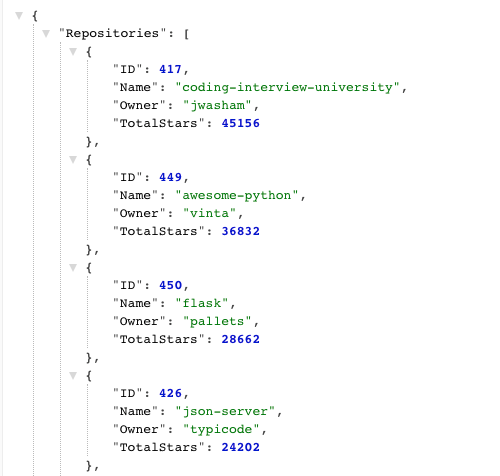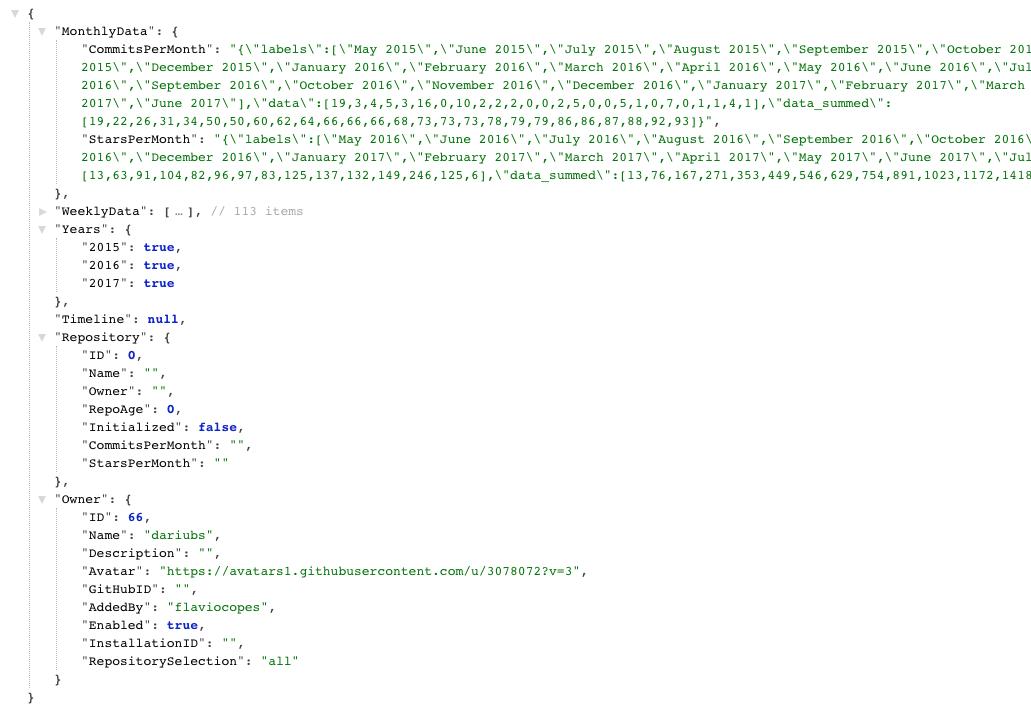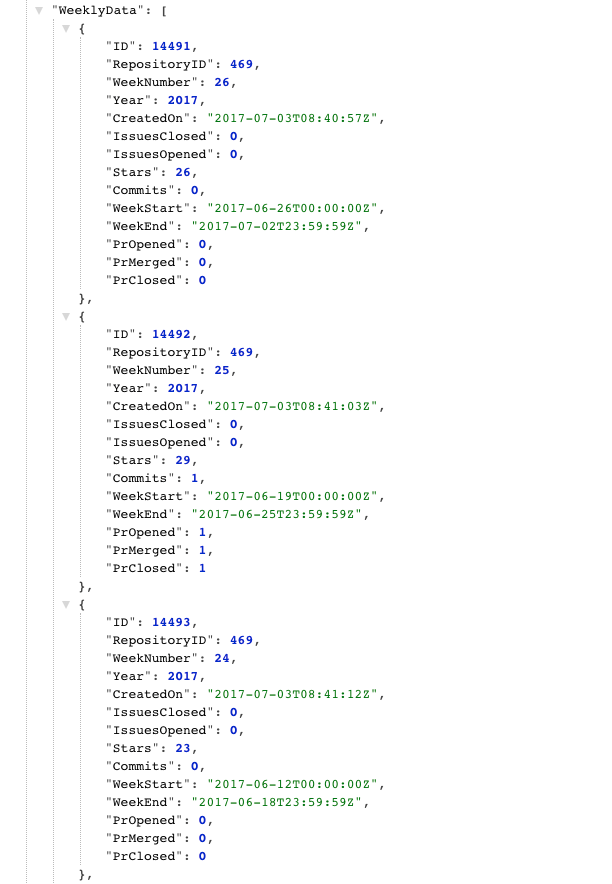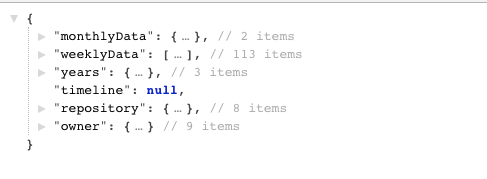Go tutorial: REST API backed by PostgreSQL
In this tutorial I’m going to illustrate how to serve a JSON API using Go. I’ll create a basic backend for a Vue.js application that will serve data already present in a PostgreSQL database.
- Introduction the problem I want to solve
- The existing database structure
- Simple HTTP response handler
- Connect to PostgreSQL
- Moving handlers to their own file
- Implementation of the
/api/indexendpoint - Implementation of the
/api/repo/endpoint - Is this proper JSON?
- Wrapping up
Introduction the problem I want to solve
I’ll have a single page application written using Vue in the browser. This app will list several Git repositories, and when clicking one of them it will show some details I elaborated elsewhere.
The API I’m going to build in this post is read-only (no POST requests).
It will have 2 endpoints:
/api/indexwill list all the repositories/api/repo/:owner/:namewill show the details of the repo identified byownerandname.
You can think of owner and name as the usual github.com URL structure: github.com/owner/name.
I’ll hook Go to an existing PostgreSQL database and serve a response based on the parameters passed to the request.
The existing database structure
The application relies on many tables. For this part, where we extract data from the database, we interact with
repositories: lists the repositories information with some absolute numbers like the number of total starsrepositories_weekly_data: stores what happened in a repo in a single week, aggregating numbersrepositories_historic_data: stores commits and stars information, aggregated per monthrepositories_timelines: stores relevant events associated with each repo, like when it reached 10k stars or when it was first created
Simple HTTP response handler
Let’s start by writing a simple HTTP server that handles 2 routes:
package main
import (
"log"
"net/http"
)
func main() {
http.HandleFunc("/api/index", indexHandler)
http.HandleFunc("/api/repo/", repoHandler)
log.Fatal(http.ListenAndServe("localhost:8000", nil))
}
func indexHandler(w http.ResponseWriter, r *http.Request) {
//...
}
func repoHandler(w http.ResponseWriter, r *http.Request) {
//...
}
This code already takes care of parallel processing of requests.
Connect to PostgreSQL
Let’s add a PostgreSQL connection. Learn more about using a SQL database in Go if you are not familiar with the concepts.
I won’t use any ORM or external libraries, just plain database/sql code.
The connection uses environment variables to get the credentials:
$ export DBHOST=localhost
$ export DBPORT=5432
$ export DBUSER=you
$ export DBPASS=pass
$ export DBNAME=dbname
(tip: if you have an empty password use export DBPASS="\"\"")
I introduce the initDb() function, which checks if those mandatory environment variables are set, and opens the connection to the database, panicking if something fails.
The db package variable contains the connection, and I keep it always open until the program exits.
package main
import (
"database/sql"
"fmt"
"log"
"net/http"
"os"
_ "github.com/lib/pq"
)
var db *sql.DB
const (
dbhost = "DBHOST"
dbport = "DBPORT"
dbuser = "DBUSER"
dbpass = "DBPASS"
dbname = "DBNAME"
)
func main() {
initDb()
defer db.Close()
http.HandleFunc("/api/index", indexHandler)
http.HandleFunc("/api/repo/", repoHandler)
log.Fatal(http.ListenAndServe("localhost:8000", nil))
}
func indexHandler(w http.ResponseWriter, r *http.Request) {
//...
}
func repoHandler(w http.ResponseWriter, r *http.Request) {
//...
}
func initDb() {
config := dbConfig()
var err error
psqlInfo := fmt.Sprintf("host=%s port=%s user=%s "+
"password=%s dbname=%s sslmode=disable",
config[dbhost], config[dbport],
config[dbuser], config[dbpass], config[dbname])
db, err = sql.Open("postgres", psqlInfo)
if err != nil {
panic(err)
}
err = db.Ping()
if err != nil {
panic(err)
}
fmt.Println("Successfully connected!")
}
func dbConfig() map[string]string {
conf := make(map[string]string)
host, ok := os.LookupEnv(dbhost)
if !ok {
panic("DBHOST environment variable required but not set")
}
port, ok := os.LookupEnv(dbport)
if !ok {
panic("DBPORT environment variable required but not set")
}
user, ok := os.LookupEnv(dbuser)
if !ok {
panic("DBUSER environment variable required but not set")
}
password, ok := os.LookupEnv(dbpass)
if !ok {
panic("DBPASS environment variable required but not set")
}
name, ok := os.LookupEnv(dbname)
if !ok {
panic("DBNAME environment variable required but not set")
}
conf[dbhost] = host
conf[dbport] = port
conf[dbuser] = user
conf[dbpass] = password
conf[dbname] = name
return conf
}
Moving handlers to their own file
Since the code will get complicated soon, I want to move the HTTP request handlers to their own file:
api/api.go
//...
import "github.com/flaviocopes/gitometer/api/handlers"
//...
http.HandleFunc("/api/index", handlers.Index)
http.HandleFunc("/api/repo/", handlers.Repo)
//...
api/index.go
package handlers
import (
"net/http"
)
func indexHandler(w http.ResponseWriter, r *http.Request) {
//....
}
api/repo.go
package handlers
import (
"net/http"
)
func repoHandler(w http.ResponseWriter, r *http.Request) {
//....
}
Implementation of the /api/index endpoint
The /api/index endpoint lists all the repositories we have in the database. There is no pagination.
For each repository it returns data that we’ll use to print an index of the repositores one can click the details and inspect:
- The name
- The owner
- The number of stars on GitHub
We need to do a query on the repositories table, which contains all the data we need, and add the data to the repositories struct, which will then be marshaled as JSON and returned to the client.
Here is the code:
package main
import (
"encoding/json"
"fmt"
"net/http"
)
// repository contains the details of a repository
type repositorySummary struct {
ID int
Name string
Owner string
TotalStars int
}
type repositories struct {
Repositories []repositorySummary
}
// indexHandler calls `queryRepos()` and marshals the result as JSON
func indexHandler(w http.ResponseWriter, req *http.Request) {
repos := repositories{}
err := queryRepos(&repos)
if err != nil {
http.Error(w, err.Error(), 500)
return
}
out, err := json.Marshal(repos)
if err != nil {
http.Error(w, err.Error(), 500)
return
}
fmt.Fprintf(w, string(out))
}
// queryRepos first fetches the repositories data from the db
func queryRepos(repos *repositories) error {
rows, err := db.Query(`
SELECT
id,
repository_owner,
repository_name,
total_stars
FROM repositories
ORDER BY total_stars DESC`)
if err != nil {
return err
}
defer rows.Close()
for rows.Next() {
repo := repositorySummary{}
err = rows.Scan(
&repo.ID,
&repo.Owner,
&repo.Name,
&repo.TotalStars,
)
if err != nil {
return err
}
repos.Repositories = append(repos.Repositories, repo)
}
err = rows.Err()
if err != nil {
return err
}
return nil
}
I can call the endpoint in the browser, and I’ll get:

Implementation of the /api/repo/ endpoint
In addition to /api/index, the app responds to /api/repo/:owner/:name requests.
This means it discards any other format of URL request, like /api/repo or /api/repo/:owner or /api/repo/1/2/3. I just want 2 tokens, owner and name.
Terminating with / the first parameter of the http.HandleFunc() call causes the handler to be called with URLs starting with /api/repo/, not just /api/repo/ like it does for /api/index.
This check is accomplished in parseParams():
// parseParams accepts a req and returns the `num` path tokens found after the `prefix`.
// returns an error if the number of tokens are less or more than expected
func parseParams(req *http.Request, prefix string, num int) ([]string, error) {
url := strings.TrimPrefix(req.URL.Path, prefix)
params := strings.Split(url, "/")
if len(params) != num || len(params[0]) == 0 || len(params[1]) == 0 {
return nil, fmt.Errorf("Bad format. Expecting exactly %d params", num)
}
return params, nil
}
Sample usage: params, err := parseParams(req, "/api/repo/", 2).
The full code of the single repo endpoint handler is printed below. Most of it is building the structs that will host the data, and filling them with database calls:
package main
import (
"database/sql"
"encoding/json"
"fmt"
"net/http"
"strings"
)
// week represents the summary of a week of activity
// on a repository
type week struct {
ID int
RepositoryID int
WeekNumber int
Year int
CreatedOn string
IssuesClosed int
IssuesOpened int
Stars int
Commits int
WeekStart string
WeekEnd string
PrOpened int
PrMerged int
PrClosed int
}
// timeline represents important events happened on a
// repository, which will be displayed on the repo timeline
type timeline struct {
ID int
RepositoryID int
Title string
Description string
Emoji string
Date string
}
// repository contains the details of a repository
type repository struct {
ID int
Name string
Owner string
RepoAge int
Initialized bool
CommitsPerMonth string
StarsPerMonth string
TotalStars int
}
// owner contains the details of an owner or a repo
type owner struct {
ID int
Name string
Description string
Avatar string
GitHubID string
AddedBy string
Enabled bool
InstallationID string
RepositorySelection string
}
// repoData contains the aggregate repository data returned
// by the API call
type repoData struct {
MonthlyData monthlyData
WeeklyData []week
Years map[int]bool
Timeline []timeline
Repository repository
Owner owner
}
// monthlyData contains the monthly activity of a repo
type monthlyData struct {
CommitsPerMonth string
StarsPerMonth string
}
// Error handling types
type errRepoNotInitialized string
func (e errRepoNotInitialized) Error() string {
return string(e)
}
type errRepoNotFound string
func (e errRepoNotFound) Error() string {
return string(e)
}
// parseParams accepts a req and returns the `num` path tokens found after the `prefix`.
// returns an error if the number of tokens are less or more than expected
func parseParams(req *http.Request, prefix string, num int) ([]string, error) {
url := strings.TrimPrefix(req.URL.Path, prefix)
params := strings.Split(url, "/")
if len(params) != num || len(params[0]) == 0 || len(params[1]) == 0 {
return nil, fmt.Errorf("Bad format. Expecting exactly %d params", num)
}
return params, nil
}
// repoHandler processes the response by parsing the params, then calling
// `query()`, and marshaling the result in JSON format, sending it to
// `http.ResponseWriter`.
func repoHandler(w http.ResponseWriter, req *http.Request) {
repo := repository{}
params, err := parseParams(req, "/api/repo/", 2)
if err != nil {
http.Error(w, err.Error(), http.StatusUnauthorized)
return
}
repo.Owner = params[0]
repo.Name = params[1]
data, err := queryRepo(&repo)
if err != nil {
switch err.(type) {
case errRepoNotFound:
http.Error(w, err.Error(), 404)
case errRepoNotInitialized:
http.Error(w, err.Error(), 401)
default:
http.Error(w, err.Error(), 500)
}
return
}
out, err := json.Marshal(data)
if err != nil {
http.Error(w, err.Error(), 500)
return
}
fmt.Fprintf(w, string(out))
}
// queryRepo first fetches the repository, and if nothing is wrong
// it returns the result of fetchData()
func queryRepo(repo *repository) (*repoData, error) {
err := fetchRepo(repo)
if err != nil {
return nil, err
}
return fetchData(repo)
}
// fetchData calls utility functions to collect data from
// the database, builds and returns the `RepoData` value
func fetchData(repo *repository) (*repoData, error) {
data := repoData{}
err := fetchMonthlyData(repo, &data)
if err != nil {
return nil, err
}
err = fetchWeeklyData(repo, &data)
if err != nil {
return nil, err
}
err = fetchYearlyData(repo, &data)
if err != nil {
return nil, err
}
err = fetchTimelineData(repo, &data)
if err != nil {
return nil, err
}
err = fetchOwnerData(repo, &data)
if err != nil {
return nil, err
}
return &data, nil
}
// fetchRepo given a Repository value with name and owner of the repo
// fetches more details from the database and fills the value with more
// data
func fetchRepo(repo *repository) error {
if len(repo.Name) == 0 {
return fmt.Errorf("Repository name not correctly set")
}
if len(repo.Owner) == 0 {
return fmt.Errorf("Repository owner not correctly set")
}
sqlStatement := `
SELECT
id,
initialized,
repository_created_months_ago
FROM repositories
WHERE repository_owner=$1 and repository_name=$2
LIMIT 1;`
row := db.QueryRow(sqlStatement, repo.Owner, repo.Name)
err := row.Scan(&repo.ID, &repo.Initialized, &repo.RepoAge)
if err != nil {
switch err {
case sql.ErrNoRows:
//locally handle SQL error, abstract for caller
return errRepoNotFound("Repository not found")
default:
return err
}
}
if !repo.Initialized {
return errRepoNotInitialized("Repository not initialized")
}
if repo.RepoAge < 3 {
return errRepoNotInitialized("Repository not initialized")
}
return nil
}
// fetchOwnerData given a Repository object with the `Owner` value
// it fetches information about it from the database
func fetchOwnerData(repo *repository, data *repoData) error {
if len(repo.Owner) == 0 {
return fmt.Errorf("Repository owner not correctly set")
}
sqlStatement := `
SELECT
id,
name,
COALESCE(description, ''),
COALESCE(avatar_url, ''),
COALESCE(github_id, ''),
added_by,
enabled,
COALESCE(installation_id, ''),
repository_selection
FROM organizations
WHERE name=$1
ORDER BY id DESC LIMIT 1;`
row := db.QueryRow(sqlStatement, repo.Owner)
err := row.Scan(&data.Owner.ID,
&data.Owner.Name,
&data.Owner.Description,
&data.Owner.Avatar,
&data.Owner.GitHubID,
&data.Owner.AddedBy,
&data.Owner.Enabled,
&data.Owner.InstallationID,
&data.Owner.RepositorySelection)
if err != nil {
return err
}
return nil
}
// fetchMonthlyData given a repository ID, it fetches the monthly
// data information
func fetchMonthlyData(repo *repository, data *repoData) error {
if repo.ID == 0 {
return fmt.Errorf("Repository ID not correctly set")
}
data.MonthlyData = monthlyData{}
sqlStatement := `
SELECT
commits_per_month,
stars_per_month
FROM repositories_historic_data
WHERE repository_id=$1
ORDER BY id DESC LIMIT 1;`
row := db.QueryRow(sqlStatement, repo.ID)
err := row.Scan(
&data.MonthlyData.CommitsPerMonth,
&data.MonthlyData.StarsPerMonth)
if err != nil {
return err
}
return nil
}
// fetchWeeklyData given a repository ID, it fetches the weekly
// data information
func fetchWeeklyData(repo *repository, data *repoData) error {
if repo.ID == 0 {
return fmt.Errorf("Repository ID not correctly set")
}
rows, err := db.Query(`
SELECT
id,
repository_id,
week_number,
year,
created_on,
issues_closed,
issues_opened,
stars,
commits,
week_start,
week_end,
pr_opened,
pr_merged,
pr_closed
FROM repositories_weekly_data
WHERE repository_id=$1
ORDER BY id ASC`, repo.ID)
if err != nil {
return err
}
defer rows.Close()
for rows.Next() {
week := week{}
err = rows.Scan(
&week.ID,
&week.RepositoryID,
&week.WeekNumber,
&week.Year,
&week.CreatedOn,
&week.IssuesClosed,
&week.IssuesOpened,
&week.Stars,
&week.Commits,
&week.WeekStart,
&week.WeekEnd,
&week.PrOpened,
&week.PrMerged,
&week.PrClosed)
if err != nil {
return err
}
data.WeeklyData = append(data.WeeklyData, week)
}
err = rows.Err()
if err != nil {
return err
}
return nil
}
// fetchYearlyData returns the list of years for which we have weekly data
// available
func fetchYearlyData(repo *repository, data *repoData) error {
if data.WeeklyData == nil {
return fmt.Errorf("Repository weekly data not correctly set")
}
data.Years = make(map[int]bool)
for i := 0; i < len(data.WeeklyData); i++ {
year := data.WeeklyData[i].Year
data.Years[year] = true
}
return nil
}
// fetchTimelineData returns all the timeline data we have in the db about
// the repo
func fetchTimelineData(repo *repository, data *repoData) error {
if repo.ID == 0 {
return fmt.Errorf("Repository ID not correctly set")
}
rows, err := db.Query(`
SELECT
id,
repository_id,
title,
description,
emoji,
date
FROM repositories_timelines
WHERE repository_id=$1
ORDER BY date ASC`, repo.ID)
if err != nil {
return err
}
defer rows.Close()
for rows.Next() {
timeline := timeline{}
err = rows.Scan(
&timeline.ID,
&timeline.RepositoryID,
&timeline.Title,
&timeline.Description,
&timeline.Emoji,
&timeline.Date)
if err != nil {
return err
}
data.Timeline = append(data.Timeline, timeline)
}
err = rows.Err()
if err != nil {
return err
}
return nil
}
And here is the output of calling /api/repo/dariubs/GoBooks:

The weeks element contains a lot of data which we’ll use in our frontend:

Is this proper JSON?
Generating capitalized properties in JSON does not look like “proper JSON”. But it’s perfectly valid. There is no standard naming of keys in JSON, and our format is called UpperCamelCase, also known as PascalCase.
But many style guides want camelCase, which starts with a lower letter. Or maybe you have a standard of using snake_case.
In this scenario you might want to use struct tags (here is a detailed Go tags introduction):
type repoData struct {
MonthlyData monthlyData `json:"monthlyData"`
WeeklyData []week `json:"weeklyData"`
Years map[int]bool `json:"years"`
Timeline []timeline `json:"timeline"`
Repository repository `json:"repository"`
Owner owner `json:"owner"`
}
and the JSON will be changed to your needs:

Wrapping up
The basic API client is ready. We can run it with go build; ./api
Of course this is just the starting point, we still have lots to do to make this a proper API endpoint, but we’re on a good track.
Where to go from here?
- Testing the API
- Adding authentication
- Adding rate limiting
- Adding API version control
→ I wrote 17 books to help you become a better developer:
- C Handbook
- Command Line Handbook
- CSS Handbook
- Express Handbook
- Git Cheat Sheet
- Go Handbook
- HTML Handbook
- JS Handbook
- Laravel Handbook
- Next.js Handbook
- Node.js Handbook
- PHP Handbook
- Python Handbook
- React Handbook
- SQL Handbook
- Svelte Handbook
- Swift Handbook
Also, JOIN MY CODING BOOTCAMP, an amazing cohort course that will be a huge step up in your coding career - covering React, Next.js - next edition February 2025